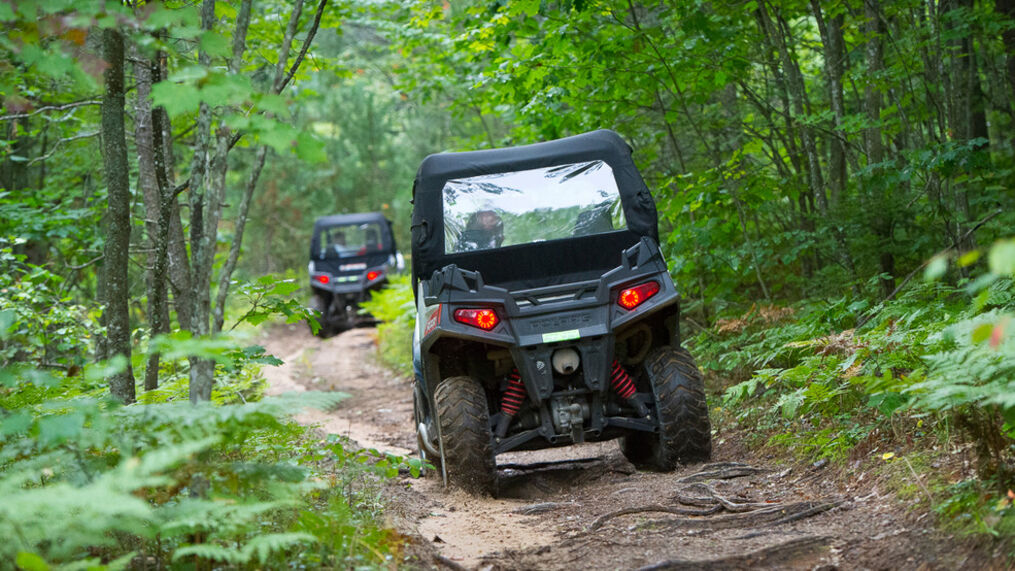Off Road Vehicles (ORV) are very popular and can be a fun activity for everyone. Recently, the DNV releases a top 10 list of ORV (Off Road Vehicle) violations that their officers encounter. The list and link are provided below.
If you are an ORV enthusiast, it may be helpful to review the list to avoid a ticket and negative encounter with a conservation officer or other law enforcement.

TOP 10 ORV VIOLATIONS AND TIPS TO AVOID THEM:
- OPERATING ORVS AT EXCESSIVE SPEEDS. Speed was one of the primary contributing factors for ORV accidents reported in 2020. ORVs should be operated at a rate of speed safe for existing conditions and the capabilities of the rider and machine.
- CARELESS OR RECKLESS RIDING. Along with speed, careless or reckless riding were among the top contributors for ORV accidents reported during 2020. ORVs may not be operated in a careless manner, in attempt to kill an animal or bird, while transporting open alcoholic beverages. Reckless and careless operation of an ORV are civil infractions, including fishtailing, doing donuts, locking up the brakes and riding in a manner that causes environmental damage.
- NO ORV LICENSE OR TRAIL PERMIT. An ORV is required to be licensed when operated on public lands, including federal, state and county roads that are open to ORV use. ORV trail permits are required when operating on the state-managed trail system. Find federal and state areas to ride on the DNR’s website; check with the county sheriff’s office for county roads open for ORV use.
- ALLOWING AN UNSUPERVISED MINOR TO OPERATE AN ORV. Legal guardians and the owner of the ORV are required to maintain direct, visual supervision of youth under the age of 16 operating an ORV. The legal guardian is responsible for any violations a youth commits while operating an ORV.
- NO ORV SAFETY CERTIFICATE. In addition to being supervised by an adult, ORV operators under age 16 in Michigan must complete an approved ORV education course and carry their safety certificate anytime they are operating an ORV. The Michigan DNR offers ORV safety education as an online or classroom-based course.
- RIDING WITHOUT A HELMET. Helmets help prevent serious head injuries. A U.S. Department of Transportation approved helmet is required when operating an ORV on any roadway, trail system or scramble area. Although there are some exceptions to when certain protective equipment is legally required, the Michigan DNR always recommends the use of proper safety gear.
- RIDING UNDER THE INFLUENCE. It is illegal to operate an ORV while under the influence of alcohol, drugs or any mind-altering substance, including prescription and over the counter medications.
- RIDING WITH MORE PEOPLE THAN THE ORV WAS MANUFACTURED FOR. Refer to manufacturer guidelines for the number of people your ORV can carry, and for safe and acceptable add-on modifications.
- RIDING ON THE WRONG SIDE OF A ROAD OR TRAIL. Just like driving a vehicle on the road, ride your ORV on the right-hand side of the road or trail. ORV paths are narrow. Riding in the middle, or on the wrong side, particularly when going around a corner, could cause a head-on collision with someone riding toward you. It’s important to stay on marked routes to avoid trespassing or hitting a rock, downed tree, barbed wire or other obstacles.
- TRESPASSING OR OPERATING IN A CLOSED AREA. Stay on designated ORV routes. Routes are marked for a reason, primarily to keep ORV operators safe. Erosion on hills and trails, destruction of stream banks and beds and conflicts with other users or non-users could lead to more restrictive riding rules or loss of trails. Do not make illegal hill climbs and avoid federal, state, county, local and private lands not designated open to ORV use.
Read more about ORV safety at Michigan.gov/RideRight. For more information about where to ride ORVs and ORV laws in Michigan, go to Michigan.gov/ORVInfo.
